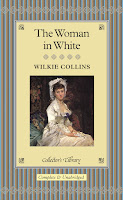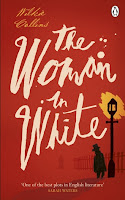I knew nothing about this classic when I picked it up on my friend Angela's recommendation.
 |
| www.panmacmillan.com |
Neither did I realize the great length as the initial copy I had from the library was a small edition with miniature print. I could not finish it in three weeks, so borrowed my mother's copy. She bought it because she read it was one of Nora Ephron's favourite books. This copy revealed I was in for a 772 read!
This book is categorized as a Gothic novel. Most of my knowledge of the Gothic novel is based on Jane Austen's satirization of the genre in Northanger Abbey. This book tells a great mystery and is filled with memorable characters.
Wilke Collins was a good friend of Charles Dickens and I could see similarities in his characterizations and dialogue. I was also intrigued by the narration of the story. It is told in letter form from several character's points of view. Collins does an excellent job of writing in different voices. Experimentation with narrative voice seems popular in classic novels. While most of our modern
novels are told by a nebulous third person, Collins, the Brontes and Austen (in Lady Susan) enjoy telling their stories as letters. There is something personal about this format if one imagines they are the intended recipient of the letters.
Collins epistolary style serves a distinct purpose in The Woman in White. The initial narrator, Walter Hartright, intends to tell the of the mysterious Woman in White in order to set it straight. In many ways, Hartright acts as a detective in this story. I enjoyed the development of his character throughout the novel. He at first seems to be a Mama's boy with little worldly experience, but the mystery itself reveals the strength and determination of his character.
The novel features two unforgettable Italian characters. Professor Pesca at first seems earnest and ridiculous and his quaint turns of phrase are expertly recorded, but he later becomes and integral piece of the puzzle. Count Fosca is another larger than life character and I would love to see him well played on screen or stage.
 |
| goodreads.com |
Marian Halcolmbe is a worthy assistant to Hartright's detective work. She is strong and courageous, but a bit inhuman in her selflessness. Her Uncle Frederick Fairlie is another memorable character, not unlike Mrs. Bennet in his nervous confinement, but one hundred times more harmful.
I enjoyed the mystery of the book and was continually surprised by the way Collins put the puzzle together. The language was enjoyable, but it took some effort to get through 772 pages. I couldn't help wondering how a modern editor would change this book!



